Showing top 0 results 0 results found
Showing top 0 results 0 results found

One-on-one real-time interactions are preferred by most of us, especially in the online shopping process. Such conversations can improve customer experience, faster problem-solving, and increase communication transparency.
Providing a chat feature can help convey attentiveness and care towards your customers.
The nature of this kind of marketing has become an essential strategy for many brands. But, first things first. How do you describe conversational marketing? What are its benefits? Why should you use conversational marketing chatbots?
🤖 Would you like to grow your business with conversational AI?
What is conversational marketing?
Let's start by gathering the most important information.
Conversational marketing is a customer-focused approach that emphasizes one-on-one, real-time interactions across various communication channels. Its primary goal is to build stronger customer relationships and provide them with a personalized online experience through customized conversations.
This approach uses tools such as live chat, messaging apps, and chatbots to engage customers in instant, personalized dialogues. Chatbots play a significant role in facilitating and automating these conversations. The strategy involves understanding and adapting to customers' preferred communication channels, often prioritizing informal tones to mimic casual conversations and meet expectations of immediate, personalized responses.Conversational marketing aims to create seamless, engaging, personalized experiences to build stronger customer bonds.
Why should you try a chatbot in your conversational marketing strategy?
Chatbots are commonly used for conversational marketing purposes because they serve as an essential communication channel in the execution of conversational marketing strategies.
Mainly, chatbots that use artificial intelligence are highly valuable as they can learn how to communicate with a particular customer, thus improving personalization.
Chatbots can streamline processes like data collection and product info, freeing time for complex tasks and decision-making.
The benefits of using conversational marketing chatbots
Incorporating a chatbot into your conversational marketing strategy can offer numerous benefits. Let's explore them.
1. A way to create more personal customer relationships
When someone feels they are talking to a friend, they are likelier to be honest. This lets you get to know your customers better, understand their needs, and solve their problems more quickly.
Thanks to using artificial intelligence (AI) and machine learning (ML), chatbots provide a tailored experience to the individual user. They comprehensively analyze user behavior, then adapt real-time responses and develop predictive models to anticipate user preferences.
Natural language processing (NLP) improves contextual understanding, while segmentation allows for targeted responses. Adaptive learning improves personalization through continuous interactions and feedback loops, providing a constantly evolving customer experience.
Personalization is a way to offer a tailored experience to every user. You can learn more about personalization in the ChatBot Academy lesson: How to Personalize Your Chatbot Communication. Amaze your customers and build better relationships with them.
2. Can be more cost effective than traditional marketing
Automating routine tasks through chatbots can lead to significant cost savings compared to hiring and training additional staff. You can allocate your human resources more strategically by focusing on complex and strategic aspects of customer interactions, while chatbots handle repetitive processes efficiently. This helps streamline operations, saving time and money that would otherwise be wasted on repetitive processes.
Automation does not mean losing the human touch with your customer. By integrating LiveChat and ChatBot, you can give your customers real-time communication at the highest level, comprehensively addressing their concerns.
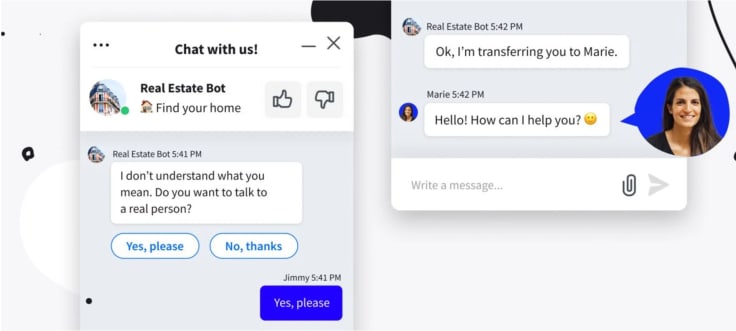
3. Helps create a better customer experience
Chatbots offer a significant benefit for your business by providing uninterrupted customer support. Unlike live agents, chatbots are available 24/7, ensuring customers can resolve their queries anytime. This feature is handy for customers in different time zones, as they can receive quick and efficient responses at any time of the day. As a result, chatbots can help improve customer satisfaction.
Moreover, chatbots boost customer engagement by providing real-time, two-way communication to answer customer questions immediately, resulting in a more interactive and satisfying experience.
Offering customers various channels to interact with your business, such as chat on your website or cloud-based telephony solutions, is vital. This allows customers to express their opinions and feedback through their preferred channels.
Younger customers may prefer to reach out to you through social media platforms. ChatBot provides a Facebook Messenger integration to make it easy to contact your company support.
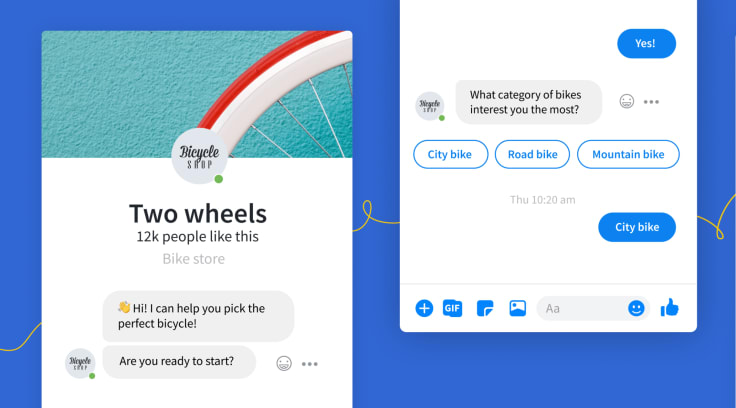
4. Can be used in hundreds of situations
There are so many ways conversational marketing chatbots can be used that it would be impossible to list them all. However, a few examples include:
- customer support,
- sales team interactions,
- gathering feedback,
- market research,
- assist purchasing,
- and even crisis management.
The beauty of this approach is that it’s incredibly versatile and can be tailored to fit any brand or business need.
5. A way to obtain quick feedback from your customers
Conversational marketing is an effective way to gather quick and valuable customer feedback. One of its main advantages is the speed at which feedback is obtained. Using chatbots for real-time interactions can provide instant insight into customer feedback, including product and service satisfaction and the likelihood of recommending a brand.
Chatbots can interact with customers to collect valuable data on their preferences, behaviors, and pain points. This information can help you gain practical insights that can be used to refine your marketing strategies, improve product offerings, and ultimately enhance overall customer satisfaction.
6. Improves lead generation
Engaging customers in conversations is a powerful way to make them feel heard and valued. This is key to building strong customer relationships, as it cultivates a sense that their opinions matter.
Chatbots can assist with lead generation and help to qualify leads based on predefined criteria.
If you want to create a chatbot script that makes converting potential customers into leads easier, check out the ChatBot Lead Generation Template. It will allow you to collect customer questions, gather their contact details, and convert these conversations into quality clients.
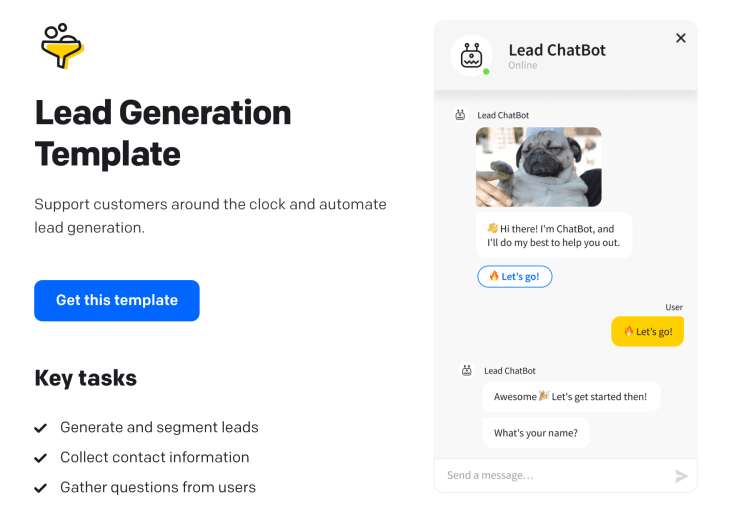
Interesting examples of conversational marketing
Now that you know what a conversational marketing strategy is and why it’s so crucial for brands, let's look at some examples of everyday campaigns that have been run successfully by various big and small companies worldwide.
1. Sephora
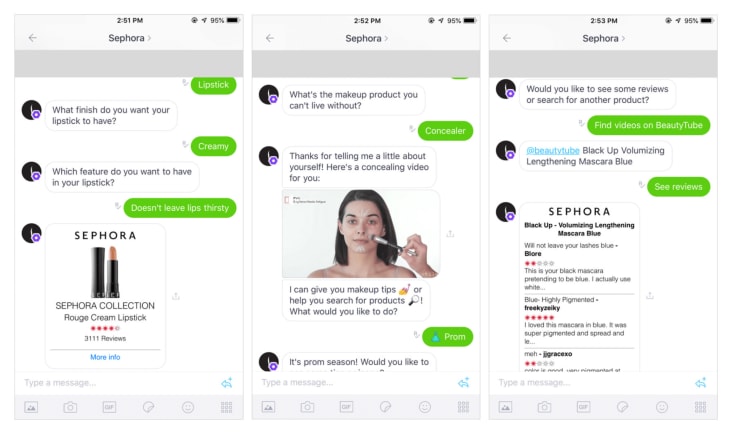
Sephora is a globally renowned company, not only for its beauty products but also for its marketing campaigns. This example of their conversational marketing is perfect.
Here, the company gets closer to its customers by allowing them to book services at Sephora directly using Facebook Messenger. Given how many people use Facebook Messenger daily, it’s an excellent strategy for the company to position itself there — with so many potential customers. The chatbot is highly responsive, intelligent, and replies quickly, which is everything people love.
2. Domino's

Another example stems from the fast-food industry. Can you imagine being able to order a pizza from any app or platform, be it Slack, Twitter, or Facebook? With Domino’s, that’s possible.
Their creative and extremely customer-centric conversational marketing campaign, Domino’s AnyWare, succeeded. Everything started when consumers began tweeting an emoji and received a pizza delivery.
It then turned into something bigger — a successful campaign. This food chain now lets you order pizza from any app you use, just with a simple emoji.
This campaign performed so well because of its level of personalization and the way it was conducted, which was close to the hearts of today’s consumers, who value easy processes.
3. eBay
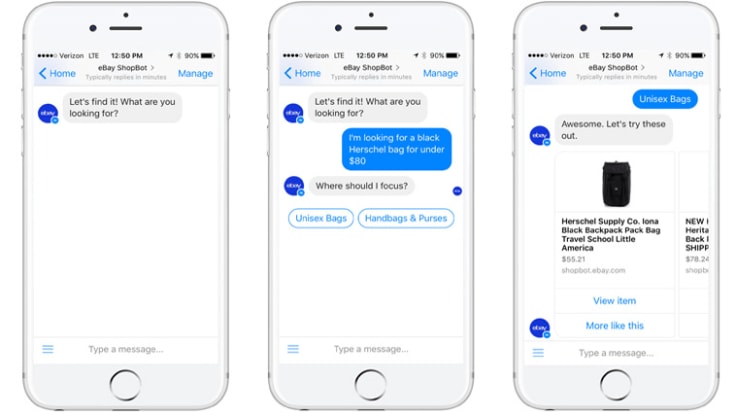
This is another excellent example of engaging customers and not looking like a total hard sell, which is precisely what conversational marketing is about. eBay customers can shop with this multinational ecommerce corporation using their own ShopBot, making the shopper feel more engaged in the purchase process and allowing employees to focus on other aspects of the business.
The way the company approaches this solution is very nice as well. They describe it as a ‘’personalized shopping assistant,’’ with their goal being to ‘’make shopping with eBay as easy as talking to a friend.’’ And the best thing? It’s fully integrated with Facebook Messenger.
🤖 Would you like to grow your business with conversational AI?
ChatBot takes care of your customers comprehensively
It's clear from the examples of the aforementioned brands that customers appreciate a comprehensive approach to customer service. To provide such a complete experience, you need the right tools.
Take an interest in ChatBot. It is a helpful tool that scans your website, help center, or other designated resource to provide quick and accurate AI-generated answers to customer questions. It also offers you the opportunity to connect with your customers in multiple ways, which can improve your conversational marketing efforts.
Check out ChatBot's integration with Facebook Messenger. Join the Text ecosystem and try ChatBot's integration with LiveChat. Integrate the tool with well-known brands like Slack, WordPress, and Zapier. Use Templates to help you with lead generation, order tracking, appointment scheduling, giving discounts, or collecting feedback on customer satisfaction.
Your business can be as close to your customers as Sephora or Domino's. Try it now and sign up for a free 14-day trial.



